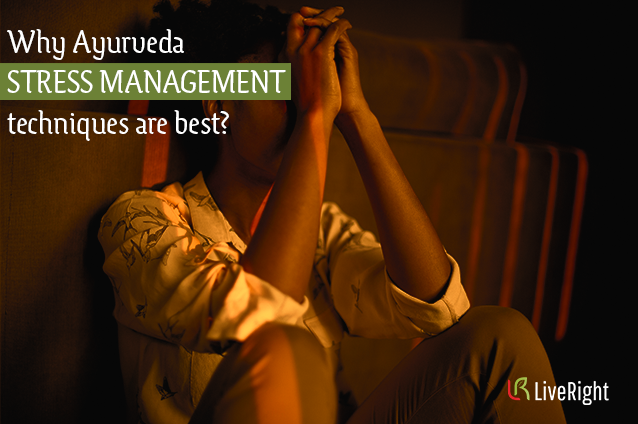Stress
The funny thing about stress is you need to stress your tongue against the teeth to pronounce the word. While enunciating the word itself, frictions start inside your mouth.
Is stress that bad?
Dr.Ashokan, the stress management expert, quotes, “Stress is Good”. He elaborates, stress is a positive force driving our body and mind to take action in every situation. Ayurveda also looks at stress as good potential power that unlocks your superpowers when you encounter the most devastating moment.
Stress is exerted in many forms. At certain times your bottled-up pressure comes out in tears, other days it’s a sheer fit of anger, and on a very few days, you will balance both like a modern metro monk.
Do you wonder why so many reactions?
Because stress is not the situation, it is your response to it. I am not stating that tears, anger, and frustration are necessarily bad reactions. Stress depends on how you react to a specific situation and it completely depends on the dosha (energy) levels at that moment of time.
When you understand the connection between your energy & emotions nobody can control you from conquering your stress. Your stress handling style is based on your own personality—Prakriti, an ayurvedic genetic code.
Everybody cries, shouts or feels like punching the wall once in a while. But experiencing the same frequently like every single day is alarming.
In this blog post, we will see how Ayurveda relates the Prakriti, Dosha, and the hormones behind them triggering you to behave in a certain way in certain situations.
Ayurveda, Physiology, and Stress
Sahas (stress in Sanskrit) is the root cause of diseases.
Although stress is neither a disease nor a disorder, it causes chronic ailments like hypertension, cardiac arrest, diabetes, and many more, specifically related to the central nervous system.
When you encounter fear in your brain or subconscious mind, your sensory organs react to the dictation of your brain and subconscious. The instructions sent by mind & brain depends completely on your Dosha levels in your body.
Physiology & Dosha
When the Vata, Pitta, and Kapha imbalance, negative stress occurs and releases harmful symptoms in your behavior, psychology, and physical.
Example: Destructive thoughts, jealousy, cold shoulder, gossiping, neck pain, headaches, twitching, low self-esteem, manipulative.
While the dosha is balanced, positive stress is triggered for the benefit of your own body and mind.
Example: Working hard, looking for more solutions, acceptance, being open-minded, and maintaining composure
Stress is a constructive adrenaline rush, given your energy dissipation is proper in your systems. It can create a surge in your energy to motivate your brain to make firm decisions even when you are a scaredy-cat. While for many of us, stress is harmful because of the improper balance of the hormones.
The negative effects of stress aggravate or lower specific hormones causing ailments like diabetes, internal inflammation, overeating, cravings, insomnia, lethargy, and lazy attitude.
If the Doshas are balanced, your body & mind works cohesively to use fear as a driving vessel to seek for a successful outcome, or else you fall prey to negative behaviors and self-sabotage.
Why Ayurvedic Stress Management is Good?
You can handle everything calmly even at a pressure cooker moment without feeling somebody is choking your throat and standing tall with Ayurvedic stress management techniques. Ayurveda stress management encourages you to accept your own personality–good or bad–without any regrets.
Ayurveda takes in the situation, environment and circumstances into consideration while addressing your stress moments, because you are an entity in a big ecosystem. Many times, you don’t have control over your situations, so Ayurveda will destress your depression and stress by allowing you to embrace every flaw with an open flexible mind.
Stress is Good
Ayurveda looks stress as your best friend. Best friends always tease us, nag us but never fail us. When stress comes, it gives two opportunities; a chance to self-evolve yourself into a better human being and completely avoid the offer of evolutionary changes.
Example: When your manager escalates your mistake at work, there is a scope for improvement in your work only if you agree with yourself inside that this will give a better solution to me and my team. I understand that the solution will come after a big blow on your face. Accepting the blow is positive stress.
In case if your dosha is imbalanced, you will raise that one eyebrow and then become a rude mule or stubborn buffalo refusing to accept the circumstance to bring growth to you. Also, soon there will be nothing but a termination letter in the future. You might get another job, but again the scene will repeat itself in that place too.
Mindful Management
Stress is not something that needs treatment, it is management. Depression might require treatment though but stress would not. You have to manage your stress on the go as each day passes by.
Most of the time, the situation is nothing but just plain flowing water, but once you start to react like anything, it becomes a whirling oceanic storm.
Example: You receive an email from your colleague stating that you have failed to send him reports last night. You might have worked all night on the report and failed to just only send him, or you would have been sick and not have done the work. But sometimes the trigger point is not from the email but from the preconceived mind which is already tired from the whole late-night work. You will immediately type a very sharp reply to start an email war.
Instead, if your dosha is well balanced, you would not start the battle but send him the report along with a small apology note. The balanced dosha brain can understand that, if the report is sent, it solves the problem and saves peace of mind for everybody.
Your brain, sensory organs, nervous system, mind are the soldiers who can fight off the negative reactions to stress with help of easeful mind management techniques from Ayurveda.
No Side Effects
Ayurveda doesn’t have any side-effects at all in treating depression or stress. Your stress will be managed only by you. Ayurveda stress management techniques are like a democracy, it is created by you, for you and of you. The same techniques and management strategies will not suit others, so ayurvedic treatment for stress is completely free from adverse side effects.
Many western medicines address pills and harmful medicines in their treatment plan, which suppresses the emotions and leads to again imbalance in the internal hormones and energies. Ayurvedic stress treatment encourages you to express, feel and accept all sorts of emotions without feeling guilt. It also promotes the concept of being who you are and evolving from there with your own self-interest.
Nothing feels pressured in ayurvedic stress treatment. The holistic approach in the stress treatment allows you to focus on your mind, body, and physiological functions too. It enhances your outward look, inner beauty and strengthens the connection between the brain & subconscious mind.
Conclusion
The moment you stop looking at stress as bad, it runs away from you. It is about the change inside your mind-perception. Perception is ruled by the strong connection between the subconscious & logical thinking which is again influenced by your hormones.
So the balance begins when you align the lifestyle changes such as food, sleep, and physical activity.
Pause a moment before taking another pill or drug for your stress management.
Focus on inside




